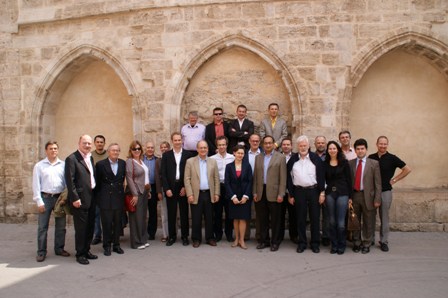From the Bells of Tallinn to the ‘castanettes’ of Valencia
.jpg) Dear Colleagues, Dear Colleagues,
During the Spring Board meeting at the end of April, the Board members could already savour the many attractions of Valencia and get to know the team in charge of the scientific and social parts of the upcoming conference which will be the 35th in EIBA’s history. After almost two decades, 19 years to be precise, EIBA has (finally) returned to Spain. It was Juan José Duran who organized one of our memorable conferences in 1990 in Madrid.
José Plà Barber, as EIBA President and teamleader, introduced us to the historic and modern aspects of his beautiful city, and also - during the late Spanish hours - to its many culinary delights. Valencia is known as the city of Arts and Science and has the largest cultural educational complex in Europe with its Science Museum, L’Hemisféric and L’Oceanografik. It will be more than worthwhile to spend a few extra days in Spain’s third largest city.
The University of Valencia goes back to 1499. It is now a leading modern European university that covers almost every branch of teaching and research. It has about 45,000 students on three campuses and a teaching staff of 3,500. The Faculty of Economics counts 8,800 students and delivers 6 Official Degrees. For the venue of the conference José Pla Barber has opted for the Fundación Universidad-Empresa, which is located in the historical city centre, close to the historic buildings and monuments and most of the hotels.

A break during the Spring Board meeting in Valencia
Fifteen of the 23 National Representatives attended the Board meeting. Together with the chairman, the executive secretary Nicole Coopman, the editor of IBR Pervez Ghauri and the Dean of the Fellows Klaus Macharzina were also present.
.jpg)
Our local hosts in Valencia
From the Faculty of Economics of the University of Valencia José introduced the key members of his team, i.e. the Chair of the Academic Programme Joaquin Allegre and the Chair of the Social Programme Francisco Puig. Fidel Leon will act as the local liaison for the Doctoral Tutorial.
As my term of office as chairman of EIBA will end after the Valencia conference, the Board already discussed the process of the selection of my successor and potential candidates. Another item on the agenda was the future venues for the EIBA conferences. With regard to the 2010 conference in Porto, Ana Teresa Tavares assured the Board members that she was making good progress. Meanwhile the location of the 2011 meeting in Bucharest was confirmed as King’s College, London had expressed a preference to host EIBA in 2012 rather than the year before. While my successor will not have to worry about the destinations of the EIBA conferences for the next three years, it remains important to decide on future venues as early as possible.
When Elsevier decided to stop the publication of its many Book Series and to sell the rights to Emerald Publishing, also the EIBA Book Series ‘Progress in International Business Research’ changed publisher. However, contrarily to Elsevier, Emerald succeeded in publishing the third volume on time. As both Emerald and the organizers of the Tallinn conference were interested to produce a fourth volume, the Board accepted my proposal that I would step in as book editor until new book editors could be appointed.
Although the Board members had known that John Dunning was seriously ill, his death at the beginning of the year was still a serious shock. Several proposals were made as to how best commemorate John’s memory. Some national representatives were in favour of a special award linked to the name of John Dunning. However, the ensuiing discussion showed that it would be difficult to establish such a prize without the necessary funding. Therefore, I took it on myself to come up with a proposal before the annual meeting in Valencia. For more information about how EIBA intends to commemorate our leading scholar, see the Special Edition of EIBA-zine November 2009: A Tribute to John Dunning.
.jpg)
For those of you who were in Tallinn and enjoyed the performance of the “bell ringers” during the gala dinner (see the EIBA Photogallery of the Tallinn conference), the sounds in Valencia will be quite different and may very well be replaced by castanettes. Whatever the social programme in Valencia will be, I am very sure that it will be an unforgettable event. This year’s conference will be another illustration of the diversity in the cultural and scientific richness of the European countries that will also be reflected in many of our academic papers. To recognize and learn from this diversity is one of the strengths of our Academy.
|
.jpg) Dear Colleagues,
Dear Colleagues,
.jpg)
.jpg)